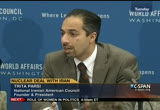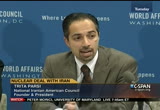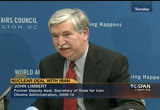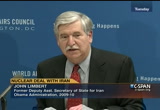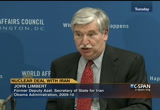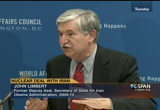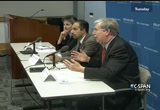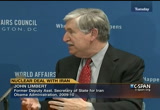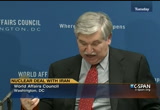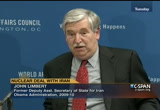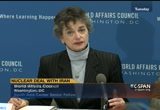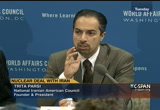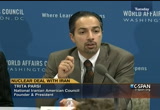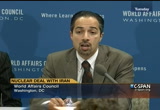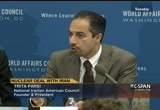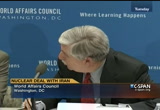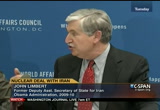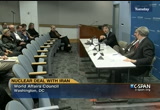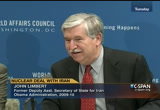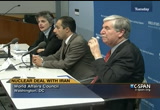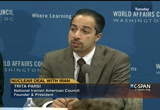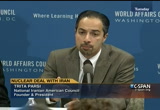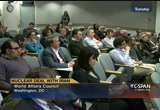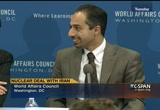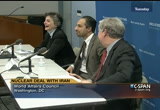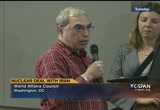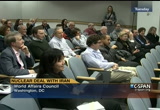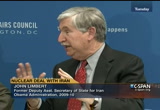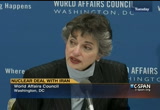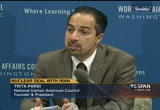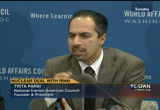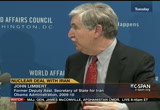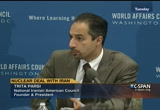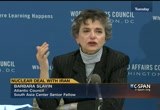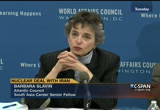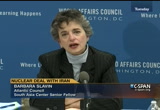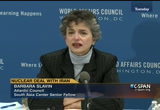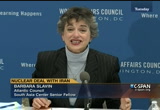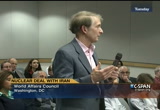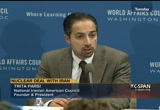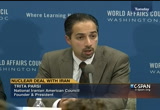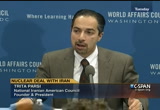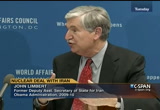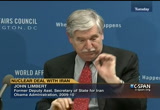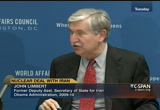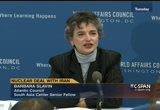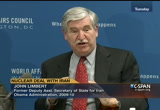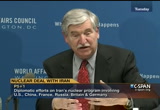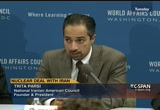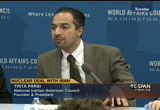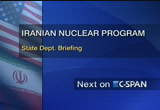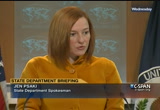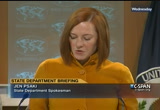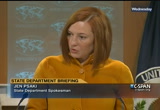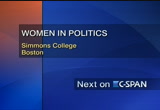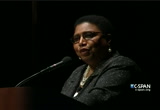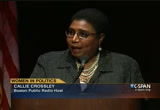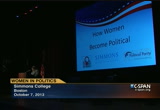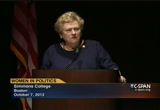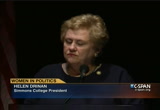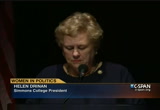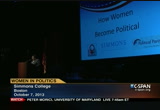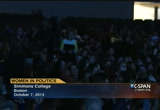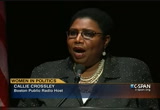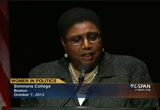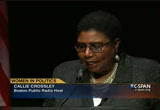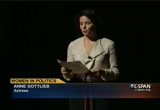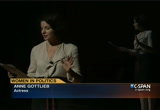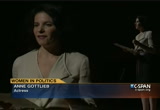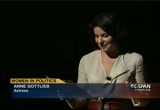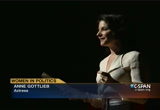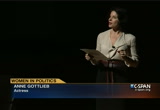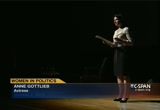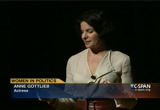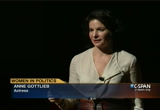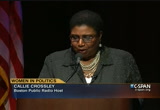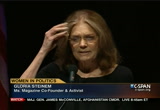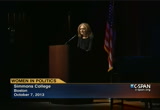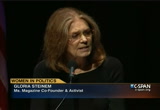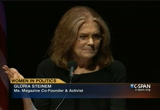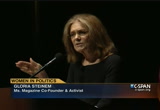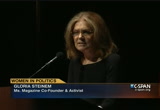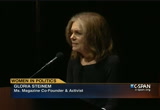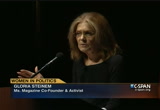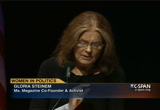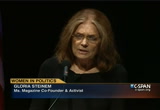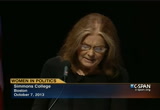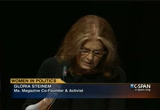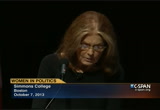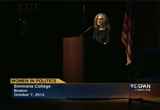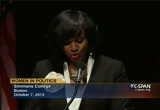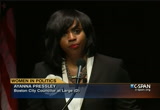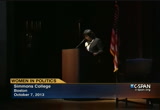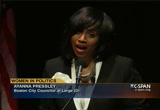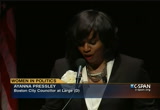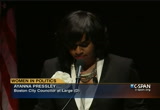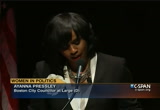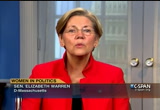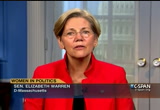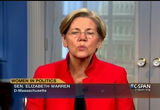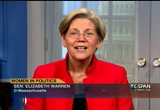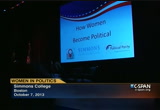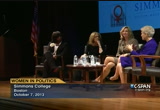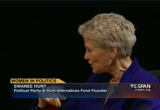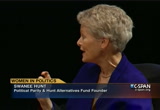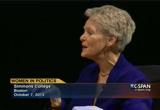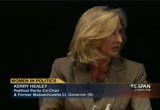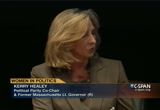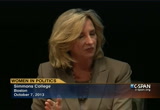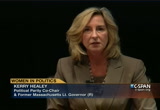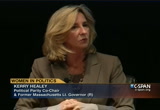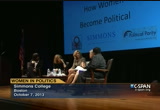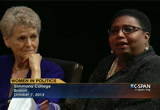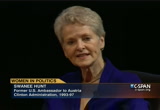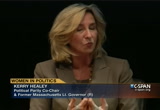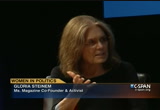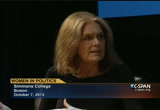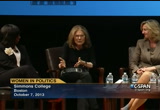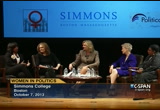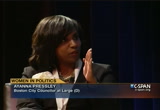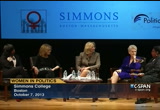tv Key Capitol Hill Hearings CSPAN November 28, 2013 4:00am-6:01am EST
4:00 am
deal. challenge may be more on the american side. it is not in the hands of the president. i have no doubt he would be able to deliver on it. sanctions that have to move through congress. the president can use waiver is, but i have doubts as to whether they can be of final complete permanent solution that ends the issue if the sanctions are still on the books, but every six months and every future president honors the deal by continuing to use his waivers. but i doubt the iranians would go along with that. waiving sanctions is an inherently reversible measure.
4:01 am
both sides will exchange reversible concessions for reversible concessions and you reversible concessions for you irreversible concessions for irreversible concessions. thank you. >> that is a great place to stop. underlying all of this is the bitter history of the u.s. and iran. no one better to talk about that then john, who has experienced it in many different ways. is this really going to make a difference between the u.s. and iran? as our iranian friends like to say, there are only two possibilities. it either will or it won't. so there we are. it is quite simple.
4:02 am
they have been speaking and writing very sensibly about iran for many years. this is a very passionate subject in this town. i tell my students at the naval academy one could spend his life going to iran in events in washington, whether it is the wilson center, the foundation for the defense of democracy. view.ideological point of you would never run out of subjects to talk about. it is an issue that a small number of people carob out cap -- care about passionately. probably 30% of that group is here in this room tonight.
4:03 am
about, i going to talk will put the question of so what and now what? -- we andthe iranians the iranians finally getting off nowhere, a road that we have been on for 30 years? of 2009, president obama offered the iranians a new beginning based on digital -- mutualmutual respect, mutual interest, that lady behind the grievances of the past -- that lay behind the grievances of a past. it caught the iranians this -- it caught the iranians offguard. discredited decades of anti-
4:04 am
american rhetoric, a staple of the diet in tehran. how does one paint as an enemy someone who sends you greetings, who speaks of mutual respect? the response to the president was at this offer -- was disappointing. it was as though the iranians saw him not as an enemy, but as something more dangerous, as arrival. means co-hey used
4:05 am
wife, something more dangerous, more attractive, and younger. something you fear more than the enemy. now it has been five years since that original outreach and finally these efforts are getting a response. what ever the value of the current nuclear deal, whether you do announce it or whether you supported, you cannot deny that today we are in a very different lace with iran than we have been for the last 34 years. look at what we have. the two foreign ministers are having professional and
4:06 am
productive discussions. timeember this, the last ofore september of 1979 -- 2013 that the two foreign ministers met was in october of 1979. disastrous.gs were diplomatcool polished walked out of those meetings completely exasperated. what should we do? before we jump in and say this is a great deal or this is a terrible deal, we should step and and take a deep breath
4:07 am
admit that we and the iranians are now talking to each other, interacting in a way that five , just ago was unthinkable could not imagine it. some will credit the sanctions sidesushing the iranians to change their approach. i am cautious. in the case of the sanctions, you need to make a distinction between what you know to be true and what you wish to be true. i think there are people who wish the sanctions had done this and therefore they say the .anctions did it what we know to be true is that the iranian economy is in bad shape. resources,ts
4:08 am
educated population, with its geography, it should be a paradise. it is clearly not. it is clearly not a paradise. frome end with something it was echoed in a beautiful poem by robert frost called the -- pastor. -- pasture. it looks like we may at last be theing in a field beyond ideas of centrifuges and subterfuges. we are not there yet, but there is at least possibilities that
4:09 am
just a few months ago no one could have imagined. thank you. [applause] i will play devil's advocate. you accuse me of being too positive. let me take the view of those who say this is an historic mistake and that we are being cheated and that the iranians will not keep their part of the bargain and sanctions will unravel and we will lose all of the leverage that we have developed. you said the iranians gave more than the americans did in this round. . am not so sure i am not so sure. the sanctions -- it is worth a few million dollars. symbolically, when you look at the fact that the entire international community had coalesced around these sanctions, now those sanctions
4:10 am
are going to begin to be eased. the question is once you start down that path, will you ever be able to get sanctions up to the point that they are at now? that is one of the critiques of this deal. that if we don't do a deal the sanctions would --ll be there he was this extremely different american president that the iranians could not wrap their heads around because he was speaking well and his middle name was hussein.
4:11 am
as a result of back and the fact that the president really tried , butdiplomacy, it failed the narrative that got created was that it fell through because the iranians. the president could tell the rest of the world to agree to sanctions that they never had agreed to before. the bush administration never even dare to dream about. now they could agree to it he cuts there was the sense that the united states actually tried. is playing the same trick on the united states. rosh hashanah greetings to the jewish people. his foreign minister is extremely charming.
4:12 am
they are serious about diplomacy. in the last rounds of negotiation, a day was spent on just to decide when and where the next meeting will be. negotiate --made made suggestions like kabul. everything was a negotiation. now it takes about five minutes to decide. the venue is now set, it will always be geneva. there is no excuse. -- that has translated into a lot of countries who have agreed to the sanctions and have agreed to , they do grudgingly not like to impose sanctions.
4:13 am
several of those countries are in europe. they are not putting pressure -- they are now putting pressure on the united states. because of your congress, congress is playing politics. if it fails now, it it will not be difficult. easy for theo be iranians to shift the blame away from themselves onto the united states. at that point, the iranians can get four more sanctions released -- can get far more sanctions released. 20% of the sanctions would drift difference.e big 20% of the sanctions would drift
4:14 am
away without the iranians giving one concession. many of the sanctions would fall apart. risk of overplaying our hand. when the iranians offered to stop the program at 3000 centrifuges and today they have 19,000, the cost of us overplaying our hand in the past is that they now have 19,000. want to do that again? the leverage will also -- will be lost. >> do you want to jump in on this? theseind many of critiques, not yours, of course, barbara. i find many of these critiques about as predictable as a clarence tomas supreme court
4:15 am
decision. you and i could write these things. assumption behind them -- you cannot trust them. they will cheat. i would say only this. iranians could never agree on anything, what about what we agreed on in afghanistan? 2001, 2002. inwhat we agreed on back same aboutargely the the lebanon hostages? if we and the iranians could never agree on anything at all,
4:16 am
then i and 51 of my colleagues would still be in tehran. is i have -- i have a theory and you tell me if you think it is crazy. has been consistently negative about these negotiations. the proposald before it was finished. after it was announced, he said it was an historic mistake. is it possible he is playing his assigned role in this? is it actually helpful for him to be so negative? if netanyahu were jumping up and down for joy, it would be difficult for rouhani to say he had gotten a good deal. it maintains pressure on the
4:17 am
united states to get more confessions -- concessions out of iran in the final deal. click >> -- >> i like your theory. i have no idea if it is true or not. by opposing the deal the way he is, he is helping rouhani and others deal with some of their more difficult constituencies. i do not think he is doing this on purpose. netanyahuse is that really still misses auckland in -he was the gift that kept on giving as far as israel was concerned.
4:18 am
at the end of the day, what is , there are about it a lot of currents within israel that are questioning his approach and saying, you are not serving the interest of israel by isolating it by getting into a public spat, public disagreement with the united states. >> you follow the israeli debate a lot. is it useful that he remains so negative? will that put pressure on the united states? is he isolating himself? will he be less relevant? >> he has become less relevant
4:19 am
and that has been very problematic for israel. i wrote in my book that at the end of the day, to serve israel's interest, it is more to be more helpful to the process and to ensure that you can be part of the process. instead of taking this extremely negative public position. the israelis did not know about the secret channel. content oft know the the conversation. it isy knew about it, difficult to understand why they were spreading data that was completely false. why diddo the content,
4:20 am
they deliberately say something that was not true? i think they did not know. israel is paying the price for having adopted the position of netanyahu. the u.s. thought they could not include israel. i do not think this is helpful for israel. it is helpful for the administration to have netanyahu come out and say this mistake.orica anything, it costs the administration more than it has cost the iranians.
4:21 am
it does not mean that they will not be strong allies, but on the issue of iran, on the issue of israel-palestine, and what is happening in the arab world, the israeli and the american perspective have diverged. the american-led order in the region fell apart once the u.s. invaded iraq. is trying to adjust to a new reality. there will be rising populations in many different arab worlds. the u.s. will no longer care and see the survival of these autocrats. when there was a coup in egypt,
4:22 am
the u.s. was not in favor of the muslim brotherhood, but not in favor of seeing egypt go back to him military dictatorship. the israeli perspective was very different. this has created a lot of tension. the chemistry between the president and the prime minister does not seem to be the best. the idea that this is some sort that isrdinated designed to add pressure on the notian negotiations, i do see them able to pull it off that way. >> it was a good theory. and we willcrophone pass it. if you could state your name. please ask a question, do not
4:23 am
give a speech. asked a legitimate question. >> [inaudible] click stanley will be the first one -- >> stanley will be the first one. getting -- giving netanyahu more credit for psychological scale. regionre talking about a that has a history of self- destructive behavior. be subtle ando clever is just incredibly stupid. >> i think there would be some in the audience who take exception to that. question, please.
4:24 am
we have heard about these bilateral talks. i was looking at a story, the islamic republic news agency. denying that there were any bilateral talks. byy dismissed speculation the associated press about bilateral talks with the united states. they rejected the ap report. why would the foreign ministry project this report? is there some internal dissension? bland,ter seemed very and his letter of endorsement in response to rouhani.
4:25 am
>> he has embraced the deal. rouhani gave a very happy speech , which he counts as his 100th day of his presidency. i would disagree and say the supreme leader has given a lot of support. the iranians still have a kind of allergy to admitting that they are doing what they are doing, which is negotiating with the americans. to learn there is deception going on in the islamic republic news agency. [laughter] that is just terrible. >> it is a very good question. peculiarities.
4:26 am
the two-year it is on the american side. -- to kill you peculiararieties on the american side. ministerputy foreign or some other negotiator in an awkward position, they have to go in front of parliament. >> there was an interesting comment. the anthropologist made an interesting comment this morning on npr and he talked about the dualities within iranian political culture, the ability to believe contradictory things at the same time. the fact that twitter and facebook are banned and blocked
4:27 am
all have theirrs own facebook pages and twitter accounts. they are addicted to them. the fact that the negotiations are happening while they are not happening should not be very surprising. >> the people who lost the .lection are not happy at all they are looking for ways to snipe, to bring down the government, to show this is not such a big deal. they are still there. they're temporarily contained, but they are still very much there. we have to be aware of it. they have their hardliners just as we have hours. -- ours. morell see who has
4:28 am
discipline in which administration is able to keep its opponents in check better. >> my name is stephen. his --nyahu lang to playing to his own house of representatives, not to the knesset? the idea that he is playing to his political base is true of having used a in his internal conversations in israel and playing up iran as a nexus into essential -- nexus existential threat, and a
4:29 am
country like israel is so strong that could be faced as a threat like iran. aaron miller told me on the radio that he would never have evoked a holocaust in the way that netanyahu is. after having done that and personified the idea that in is hitler inani sheep's clothing that he could not turn around and say, that is a great deal. he will have to oppose it until the very last moment. his political constituency will say, you told us this is a threat. why did you not oppose it and to the last possible second?
4:30 am
that is highly unhelpful for israel. quickly shifting strategic environment, it union leaders that have the ability -- you need leaders that have the ability to quickly adjust to a shifting reality. not in yahoo! has locked himself in a will not play well -- netanyahu has locked himself in. >> let me ask about the saudis. they have put out statements that are more neutral. are they adjusting to this? are they quietly fuming? >> i do not know the answer to that question. the saudi's have made a statement which was much more moderate and much more measured. i am sure they are not happy about this. on the other hand, for a lot of
4:31 am
reasons, they are not going to want to identify with what netanyahu is saying. it does not look good in their domestic political agenda for them -- for these two to be lining up together. i am not an expert on saudi arabia, but it is quite clear that there has been some interesting contradicting behavior. companion for u.s. security council seat. it indicates there are some significant divisions within the saudi elite right now, within the government. contradictoryhe messages may continue and may not signal much more than that
4:32 am
they are not sure what to do. >> the gentleman back there. larry feinberg. how does this agreement differ from the agreement they negotiated with north korea? korea.ve covered north there are two analogies that come up all the time. 1938, munich, the not cease -- nazis. the other one is iran is north korea. >> [inaudible] >> the nature of the regimes are different and the agreements are different. north koreans cheated and therefore, the iranians will cheat.
4:33 am
this was the 1994 agreement that clinton reached with kim jong-il in north korea. agreed for 10ans years the agreement worked. the north koreans kept their plutonium reactor. the united states delivered heavy fuel oil. the u.s. deliveries were often late because congress would not appropriate the money on time. this was a perpetual problem that north koreans talked about. the reactors were never completed. negotiations continued with the north koreans. went to northight
4:34 am
korea in 2000. they were talking about negotiating a deal on north korea's missiles as well. the negotiations went well. bill clinton had to decide and flip a coin at the end of his presidency whether he was going to go to earth korea or try to finalize an arab -- israeli peace agreement. wrong choice. , colinw. bush came in powell wanted to continue and wanted to pick up where north korea -- where clinton left off. he was publicly humiliated for making that statement. bolton went about leaking information that the north koreans might have a secret program to enrich uranium. then there was a confrontation in 2002.
4:35 am
the whole deal fell apart. the north koreans started up the reactor again. there were other agreements that were reached with the north koreans. in 2005, there was an agreement that was reached. the north koreans broke it. the nature of that agreement was that they would stop the plutonium reactor. in return, they would get various concessions. different,gimes are but north korea is a bizarre dictatorship that relies entirely on support from one country, china. beenood aid that it has able to cage out of the united states over the years. discussingat we are
4:36 am
now with iran is quite different. the nature of the sanctions is quite different. i do not see that they are comparable. at some point, yes, we made promises to build reactors. situationse that being the same and i do not think it is appropriate to make that comparison. we have to take each case on its own merit. we have to make sure we have verification and this is something that is built into this. the north koreans kicked out the iaea. to this day, they have not permitted the kind of inspection that iran has routinely. we have a better sense of what the iranians are up to. the iranians are not as far
4:37 am
along in terms of their ability to build weapons. the north koreans have than working on their plutonium program starting in the 1980s. they already had enough plutonium for at least one and possibly two nuclear weapons. i do not see them as the same. >> [inaudible] i used to work on nonproliferation at the state department. the key thing here is congress. members of the republican party are determined not to give president obama a victory at any cost.
4:38 am
i am worried this agreement will get caught up in that politics. what is the role that congress has to play on this agreement? at some point, it will be a treaty. [inaudible] envision their having to be a treaty. congress is nevertheless key. european past their sanctions to their executive branches. they have a foreign ministry meeting. not of the national legislators are involved in the process. it is created to take time in order to make sure there are not any fast changes. the american sanctions are a
4:39 am
spider's web. it is very difficult to move one without moving all. , the biggestion sanctions go through congress. only congress can lift sanctions. if it is a congressional act, only congress can undo them. this creates a significant difficulty. we are in an unprecedented partisan atmosphere. brought us to a government shutdown, which at first, people think it would not happen. it almost brought us to a default. deal with nuclear iran is nothing for these guys.
4:40 am
434 years, there has not been a conversation on capitol hill -- years, there has not been a conversation on capitol hill about lifting sanctions. it is going to be a completely different paradigm. this cannot come until the very end of the process, it also, the concession, which is to ratify will have to go through their parliament. the sad thing is their parliament is picking up bad and howom our congress to create more difficulties. >> not all the sanctions will
4:41 am
have to be lifted. these are only the nuclear related sanctions that are specified in the agreement. the u.s. and iran are still going to have sanctions between them for a very long time. theyuestion is whether would be sufficient to seal the deal. >> the reality and you can i understand this, that there were sanctions against the former soviet union that remain for 20 years after the soviet union disappeared. of gettingal act congress to reverse them is very cumbersome. the other thing i experienced when i was working for the state and 2010t back in 2009
4:42 am
when onen affairs was spoke individually too many members of congress on both sides, people were very reasonable and sensible on this issue. and aen it came to a vote public statement, these things margins. very large even if the sanctions -- even if it is nonbinding, this is very difficult to explain to the iranians. in the spring of 1979, the
4:43 am
united states appointed a new ambassador. this was a confidence building measure. a goodwill gesture, something the iranians said they wanted, a sign of american goodwill. while that ambassador was submitted to tehran, congress passed a nonbinding resolution condemning the excesses of the revolutionary courts. wild.ran, people went to the media, everyone, just went on a frenzy and sank the nomination. this is a nonbinding resolution. we got nowhere. somethingility of
4:44 am
and this repeating derailing the process is still very much out there. time for a have couple more. wait for the microphone, please. >> my name is stuart. whatestion is regarding implications do you think this deal has for the other sticking points between the united states and the iranian government? what does this signal for going forward? >> this was a necessary first step. we were never going to be able to have the discussion about serious or hezbollah -- syria or hezbollah. it would've been difficult to have those conversations without a nuclear agreement. it is my hope that we can broaden the conversation now
4:45 am
that we have a nuclear agreement. i would love to see a restoration of diplomatic negotiations. if we have routine conversations between john kerry and others on a lower level, that opens up a lot of prospects. in january, there is going to be a conference in geneva on syria and most likely, the iranians will be there. i have always advocated a broader agenda with iran. issue -- there were issues that were so idle to -- to eachissues of side, issues of nonproliferation, national pride
4:46 am
, this was going to be very difficult to resolve. what had happened, if you'll pardon the expression, you were holding the whole relationship . stage to the nuclear issue some people within the administration agreed with me, that line of argument got nowhere. it is very clear that at least , it is allp5+1 nuclear, all the time. issue -- until there are signs of progress to move beyond it. when the president spoke after this deal was reached, i did not
4:47 am
hear him say anything about a new beginning. what he said in 2009 -- i suppose at this time, that would be a bridge too far in terms of this administration. look, this is the major issue and this is what we are going for. >> i think john is absolutely right. they managed to get the first deal. those sites were only focusing on the nuclear issue.
4:48 am
to build maximum trust, confidence in order to insulate and make sure the nuclear track is as protected and solid as possible. the inevitable difficulties it will run into will not derail it i'm making sure they are hedging it with a couple of issues. there appears to have been something in regards to serial's -- syria. is positiveof that because at the end of the day the fact that the united states and iran could not deal with each other in spite of the disagreements, the fact that they could not even talk to each other exasperated all of their own problems, but almost every other problem.
4:49 am
normalized,has been there will no longer be a when johnn a paper kerry picks up a phone. the possibilities will be quite great. it does not mean that they will become friends. they areot mean -- walking away from the brink of disaster. >> that seems like a really great moment to stop. so i think we are going to. thank you
5:00 am
[captions copyright national cable satellite corp. 2013] [captioning performed by national captioning institute] >> all right. we have some power houses in the audience with us tonight, not just here on the stage. we want to acknowledge some of the remarkable women who are present as well as their male allies. i want to ask each group to stand and remain standing. please hold your applause until
5:01 am
the end. i know that will be tough. but really try. we are honored to have present tonight a number of women who were each the first woman to hold a different statewide office. i asked that they stand while you hold your applause. evelyn murphy, the first woman elected lieutenant governor. shannon o'brien, the first woman elected state treasurer. jane swift, the first woman to serve as governor. martha coakley, the first woman elected state attorney general. suzanne buff, the first woman elected state auditor. and, of course, the sixth person who is a part of this group though not with us tonight, elizabeth warren, the first woman senator from massachusetts in the u.s. senate. let's have a little applause right there. [applause]
5:02 am
in addition, we have a number of other important female elected officials some of whom are with us tonight. we're honored to have present as well, steve grossman, treasurer of the commonwealth. and would other male elected officials stand who are here tonight in support of the cause of women in politics? [applause] tonight's event was sparked by a milestone in women's political activism 175 years ago right here in boston. angelina grimke, a white southerner from charleston, south carolina, became the first american woman to address the
5:03 am
legislative body. tonight, we are honored to have her great-great-grandson with us. please give him applause. [applause] angelina grimke's purpose in addressing the legislative body was to present petitions bearing the signatures of 20,000 massachusetts women, black and white, to a joint committee of the general court. the petitioners sought to have congress end slavery in the district of columbia. before grimke spoke about the issue of slavery, she knew she had to address the elephant in the room -- the fact that she was a woman giving a speech to a group of elected officials, not to mention her other audience -- all the men and women who had crowded into the house chamber.
5:04 am
hers was a radical act in 1838, not only because women could not vote or run for office but also because of the firm societal conviction that women did not belong in what was called the public sphere. indeed, a woman who spoke to a mixed audience of men and women gather for any purpose was considered a -- a seductress since she was putting her body on display before men. in the remarks we will hear tonight, which are the only parts of the grimke speech that exist today, she tackled the charge of seductress head-on by distancing her unorthodox action from that of another woman, the famous biblical woman, queen esther of persia. grimke's bible-reading audience knew that esther lived in a hall of famer and served him sexually.
5:05 am
it was not her place to request anything of hurricane. one day, risking her life, she begged him to save her people, the bab loanian jews. here is an actress to share the opening of angelina grimke's speech that day. [applause] > february 21, 1838. mr. chairman, more than 2,000 years have rolled their dark and bloody waters down the rocky, winding channel of time into the broad ocean of eternity since a woman's voice was heard in the palace of an eastern monarch and achieved theition
5:06 am
salvation of millions of her race from the edge of the sword. the queen of persia, if queen she might be called, who was but the mistress of her voluptuous ord, trained in the secret abomination of an oriental hall of famer, had studied too deeply the character not to know the sympathies of his heart could not be reached, except through the medium of his sensual appetites. hence, we find her arrayed in royal apparel, standing in the inner court of the king's house, hoping by her personal charms to win the favor of her lord. and after the golden scepter had been held out and inquiry was made, what will thou, queen
5:07 am
esther, and what is thy request, it shall be given thee to half of my kingdom, even then, she dared not ask for her own life or that of her people. she felt that if her mission of mercy was to be successful, his animal propensities must be still more powerfully wrought upon. the luxurious feast must be prepared. the banquet of wine must be served up. the favorable moment must be seized. when gorged with gluttony and intoxication, the king's heart was fit to be operated upon by the appeal. if i have found favor in thy ight, o king, and if it please the king, let my life be given at my petition and my people at y request.
5:08 am
it was thus, through personal charms and sensual gratification nd individual influence that the queen of persia obtained the precious boon she craved -- her own life and the life of her eloved people. mr. chairman, it is my privilege to stand before you on a similar mission of life and love. i thank god we live in an age of -- too enlightened to -- i feel that it would be an insult to the committee were i to array my person in gold and silver and costly apparel by inviting them to partake of the
5:09 am
luxurious feast. i understand the spirit of the age to well to believe that you could be moved by such sensual means, means as unworthy of you as they would be beneath the dignity of the cause of umanity. i feel that if you are to be reached at all, it will not be by me but by the truths i shall endeavor to present to your understanding and your hearts. the heart of the eastern despot was reached through the lowest propensities of his animal nature by personal influence. yours, i know, cannot be reached but through the loftier sentiments of intellectual and oral feelings. i stand before you as a citizen, on behalf of the 20,000 women of massachusetts whose names are
5:10 am
enrolled on petitions which have been submitted to the legislature of which you are the organ. these petitions relate to the great and solemn subject of american slavery, a subject fraught with the deepest interest to the republic, whether we regarded in its political, moral or religious aspects. because it is political, it has often been tauntingly said that a woman has nothing to do with it. are we aliens because we are women? are we bereft of citizenship because we are the mothers, wives, and daughters of a mighty people? ave women no country, no
5:11 am
interest, stake in public will, no partnership in a nation's guilt and shame? let the history of the world nswer these queries. denunciations of --the n hovea against crimes of israel's daughters. see her wielding her power too often to debase and destroy rather than to elevate and save. it is often said that women rule the world through their nfluence over men. if so, then may we well hide our faces in the dust and cover ourselves with sackcloth and ashes. it has not been through women's moral and intellectual power but through the baser passions of
5:12 am
man. this dominion of women must be resigned, the sooner the better. in the age which is approaching, she should be something more. she should be a citizen. and this title, which demands an increase of knowledge and of reflection opens before her a new empire. i hold, mr. chairman, that american have to do with this subject not only because it is moral and religious but because it is political. in as much as we are citizens of this republic and as such, our honor, happiness, and well-being are bound up in its politics and government and laws. stand before you as a
5:13 am
southerner, exiled from the land of my birth by the sound of the lash and the pitious cry of the slave. i stand before you as a repentant slaveholder. i stand before you as a moral being, endowed with the precious and inalienable rights which are correlative with solemn duties and high responsibilities. as a moral being, i feel i owe it to the suffering slave and to the deluded master, to my country and to the world to do all i can to overturn a system of complicated crimes built on the broken hearts and prostate bodies of my countrymen's in
5:14 am
chains, cemented by the blood chains, cemented by the blood, sweat, and tears of my sisters in bonds. thank you. [applause] [applause] > anne gottlieb. anne gottlieb as angelina grimke, fabulous. angelina grimke's actions built a foundation for women who became political after her. let's hear from three of those women, each of whom has her own story to tell about her path to political action. gloria steinem is a writer, lecturer, and feminist activist, and i would say so much more. [applause]
5:15 am
>> i never imagined that i would be following angelina grimke. [laughter] in another way, i have always been following angelina grimke. and sojourner truth and frederick douglass and shirley chisholm and all of our leaders ho have always understood that the twin caste systems of sex and race are intertwined and can only be uprooted together. i have been asked by lucy knight, from whose forehead -- who was it who came from the head of zeus? >> athena. > thank you. this conference has sprung, to
5:16 am
speak personally about how i became political. so, i'm hyperaware that i had an advantage that angelina did not have, which is a mother who, if you said the word roosevelt to her, tears came to her eyes because she was so convinced that eleanor and franklin had understood us, despite being born class levels above us, had cared about us during the depression, and had rescued us from her days of making soup out of potato peelings and my sister's coat out of a blanket. all of my childhood years, i heard a story of life that included politics. it was just something you did everyday. t wasn't a career. it wasn't something removed, certainly.
5:17 am
it was an organic part of our lives, something we needed to live. then after college, i went to india, where i lived for two years. there i saw people lined up for days, two, three, four days, almost as long as florida -- [laughter] e vote because incidence had taught them how important that power was. they knew very clearly that the only place on earth where the most powerful is equal to the least powerful is the voting booth. and it is still true to this day that the young and the poor in india vote more than the older and the well-to-do, the very opposite of the voting patterns we see here ourselves.
5:18 am
when i first tried to work on a campaign, however, on a mimeograph machine -- how many people here remember the word mimeograph? [laughter] i was told, with some other young women, to hide in a room upstairs because they were afraid we would be seen as having an affair with a candidate. this sums up the role of women inside campaigns at that point. but nonetheless, i could see that campaigns were incredibly exciting, open. people could come in off the street and help. i became immediately hooked on the whole process of campaigning. and i stayed hooked as a volunteer for a very long time. through kennedy --
5:19 am
i think i was sent out to get pizza all the time in the kennedy campaign. through lbj -- we ran a discotheque for lbj. [laughter] but it really wasn't until the women's movement came along that it became clear to me and to so many of us that we would not be able to be active politically unless we had a force outside either party by ourselves, on our own, bringing up the ssues. and i would like to say on this ubject of parties that the epublican party was historically better about women's equality than the
5:20 am
democratic party. it is the republican party that has deserted women, not that women have deserted the republican party. we worked to get our issues into the mcgovern campaign. the only time i ever ran for office myself was as a delegate for shirley chisholm, clearly going to lose, but determined nonetheless. i testified in congress for the equal rights amendment mainly because someone told me i should it didn't ever occur to me that anyone other than a constitutional authority would be testifying there. i worked on my testimony for weeks. it made no difference whatsoever. so i began to think more about organizing outside the campaigns and the political structure. think that has been my path ever since, with the national women's political caucus, with voters for choice. it is possible for us to both educate on the issues, educate the candidates and the people in the party on the issues, and
5:21 am
gather the constituency around those issues so we have the power to see that they will succeed. it is a path i recommend to you. i guess i am a classic activist volunteer. i have never had a paid position. i have written speeches. i have worked in campaigns but never actually been paid because i think i thought if i were an employee i wouldn't be able to press, to say, you know, this is what is necessary to get this kind of support. but i always remembered my mother, who used to say, "democracy is something you do everyday." democracy is like brushing your teeth. it has to be something we do every day. otherwise, the power will be
5:22 am
taken away from us. i thought of this especially after the 2000 election, when i happened to be speaking at palm beach county community college the morning after the election, quite by accident. there were about 700 people in that auditorium. over the next few hours, we had no idea of the outcome, whether it would be bush or gore. we didn't know. but people began to stand up and i r say how their vote had been taken away from them. that they were kept away by police cars, or that their buses had come from a senior home and taken them to the wrong place, or that they only realized afterwards that the nature of the ballot had caused them to vote for a candidate they did not know they were voting for. and slowly, of about the 720
5:23 am
people in the auditorium, more than 100 had been unable to ote. i took their names and addresses and i gave them to lawyers. one man stood up and said he was a veteran. he said in the name of his little daughter, would i stay and help the march against this illegal election? i say that because it made me remember -- and all the subsequent events, which -- the ruling of the supreme court and so on. if i ever wondered how important it is that we are all political, that certainly clinched it. because i remembered that in missouri three decades before, more or less, i had campaigned for harriet woods for the senate of the united states, and she had
5:24 am
been within one percentage point but she ran out of money. the television ads were very egative. she lost by a very heartbreaking argin. john danforth became the senator from missouri. that was a long time before, right? it was less than 2000 votes that made the difference. it was so clearly about money and about last-minute money -- her race was the inspiration for starting emily's list, which means early money is like yeast. it was clear that she should and ould have won. because she lost, because not enough people in missouri and not enough women voted, danforth had once hired in his attorney general's office a young man named clarence thomas, who had
5:25 am
left his studies at -- as a catholic priest to go to law chool. danforth sought out this rare black conservative, took him out of his job as a corporate lawyer for monsanto -- [laughter] made him a legislative aide and championed his career every step of the way. thomas became chair of the equal employment opportunities commission where he dismantled class-action suits and so on, here he made every member of his staff watch the fountain head because he was a dweetee. you can't make this stuff up -- devotee. you can't make this stuff up. he served on the d.c. court of appeals. we all know what happened. so, i just want to say to you
5:26 am
that when we think about our individual votes and our activism, we need to remember the parable about for want of a nail, the horseshoe is lost. for want of a horseshoe, the horse is lost. for want of a horse, the battle is lost. because of clarence thomas' vote arguably on the supreme court, this should be a mantra for everyone who thinks voting doesn't matter -- if harriet woods had not been narrowly defeated by danforth, he would not have been a senator if he had not been a senator, he would not have taken clarence thomas with him to washington. if thomas had stayed a lawyer in st. louis, he would not have been appoint bid the first president bush. if he had not had those credentials, he would not have been nominated for the supreme court by the same president bush. if he had not been on the supreme court, he would not have been the one-vote margin that halted the recount and put the second president bush in the hite house even though independent counts later showed
5:27 am
that indeed gore had won the state of florida. then bush 2. now all of this is for want of a nail, right? then bush 2 couldn't have caused yet another optional war in iraq , the biggest transfer of wealth from public to private hands in the history of the nation, another optional war in iraq, a high-level disbelief in global warming, public schools with abstinence only sex education and forced by federal funding that helps to create the highest unwanted pregnancy rate in the entire developed world or an executive order giving billions in tax dollars to faith-based centers of right-wing political ower, or the global gag rule that deprived poor countries of u.s. foreign aid if they offered any information about abortion, even with their own funds, or corporate profiteering on privatized wars abroad as well
5:28 am
as privatized prisons at home, prisons we don't need and yet the state legislatures vote and are run by corporations. or a higher population in prison as a result than any other country in the world. or corporate ceos whose salary rose from 30 times that of the average worker before the right- wing backlash took over washington to an average of 8000 times. or an unregulated financial industry that led to financial worldwide economic meltdown or an even greater polarization of people and nations into rich and poor. or the turning of terrorism from a cause for global unity into a cause for deeper global division. nd so, so much more. so, each of us is the nail, and each of us can win the battle. thank you. [applause]
5:29 am
5:30 am
audacious demonstration of our fellow sister, angelina grimke, who went boldly before the general court in 1838 to proclaim, "i stand before you as a citizen." today, we pay tribute to grimke and acknowledge this moment. and i, for one, am so very grateful that we are. as a black woman, i know i am certainly -- we all are beneficiaries of her bold action but what i also know is that oment, the one we honor here today, was a very long time in he making. both in the personal evolution of grimke, for the abolitionists and women's movement, and for our country. you see, before angelina was a woman, she was a girl. for me, the conversation must begin there. before we can even begin to consider how women become political, let's first address the girl on the journey to womanhood.
5:31 am
the girls i spend time with every day, the girl that exists inside all of us, the girl who is stunted in her development and empowerment because she lives in a world that all too often refuses to see her, to listen to her. the 18-year-old college freshman who wants to run for student government president but instead settles for secretary. the 17-year-old girl who doesn't raise her hand in class. the openly gay 15-year-old girl who feels unsafe in her community and at school. the 16-year-old girl who feels degraded when men holler at her when she is walking down the street. the 14-year-old girl who is in an unhealthy relationship with her first love. and the 12-year-old girl who does not believe she can excel at math or science. broken girls grow up to be broken women.
5:32 am
as a society, we quite simply cannot afford that. i strive daily to chip away at systemic lies and social determinants like poverty and violence that contribute to the brokenness of so many of our girls. the chief issue is something -- so much harder to get at. something i can't legislate is the insidious and permeating impact of girls who do not know their worth, who don't know their power. i know something about that. for many years and for many reasons, i struggled to stand fully in my power. i allowed others to determine when and where i would enter. i didn't feel good enough, smart enough, ready. those nagging feelings, that mental tape of unworthiness that i played in my head was an
5:33 am
albatross, an impediment, a shackle that i didn't even know i was wearing. as i young girl, i met with this life epiphany when i suddenly realize that although my troubled past informed my present, i certainly didn't have to be hostage to that past. well, i was finally able to stand fully in my own power and, in that moment, liberate myself, and ultimately set on a pathway to a position where i liberate legions of girls and women daily who similarly struggle. as i consider my journey to becoming political, i suppose i could tell you it was in church where i first learned to stand before an audience and project my voice and command the attention of a room. i suppose i could tell you about my mother, my shero, her
5:34 am
inspiring example as a tenant organizer and activist for the urban league, how she sacrificed her very life to ensure that i would never be denied or deprived an opportunity in life, that she taught me the very best thing about politics. that is the strength and the power of advocacy. and she demonstrated that by her example in that she was a fierce advocate for me. i suppose i could tell you how running and being elected to numerous high school and college leadership positions provided a great political training ground. i guess i could then tell you about the rarefied a lyrical tutelage i received as an intern and later an aide. i could remind you that i have made history twice because the people of this great city
5:35 am
entrusted me with the awesome responsibility and honor of representing you. i could tell you all of these things, or i could just tell you the truth. it almost didn't happen. the great shirley chisholm, a shero of mine, when asked how she wanted to be remembered, said that she didn't want to be remembered as the first black woman elected to the congress nor as the first black woman to ursue the u.s. presidency. instead, she simply wanted to be remembered as a black woman who dared to be herself. so, sisters, this is our challenge and our charge -- to ensure that every girl feels empowered to dare to be themselves. because you see, only then will they ever fully truly dare to be political. thank you. [applause]
5:36 am
>> all right. [applause] elizabeth warren is the u.s. senator from massachusetts. while she greatly regrets she cannot be with us tonight, she sent us a video instead. please note that this video was taped before the events of the government shutdown. [laughter] >> good evening and thank you to the grimke event planning committee for inviting me to join you tonight. it is a great event and i wish i could be with you in person but we are going to have to settle for this video. i'm glad to be here to mark the 175th anniversary of angelina rimke's historic speech to the
5:37 am
massachusetts general assembly and the 20,000 massachusetts women who joined her petition to end slavery. it is an incredible time to celebrate the legacy of courageous women in the abolitionist movement. their efforts grew into the fight for suffrage and for equal rights. this anniversary is also a reminder of the powerful impact we can have one we make our voices heard and we stand up for what we believe in. i never planned to get into politics. i spent pretty much my whole career as a teacher and as a law professor. i taught bankruptcy and did research on the economic squeeze on middle class families. and then i got a call from a congressman who asked me to help advise a federal commission that was being set up to review the bankruptcy laws. at first i told him no. i don't like politics and i didn't want to get involved.
5:38 am
but he had a hook. that i would have a chance to fight for working families. so, i've made my first trip to washington. for me, this first effort to try to help shape the laws that affect the lives of summoning -- of so many people ended up being about deep faith, faith that if we work hard and work together, we can make a difference that really matters. one fight led to another. bringing some accountability to the bank bailouts, adding a consumer agency, setting up that agency. when i first proposed to protect people from the tricks and traps of big banks and ready card companies, people said -- and credit card companies, people said it will never happen because washington lobbyist would make it a first priority to stop us. and they fought us every inch of the way. but we organized and we brought together a broad coalition.
5:39 am
and we won. and now the consumer agency is making a difference, holding big banks accountable. it has already returned more than $800 million to people who were cheated on their credit cards and other financial products. at is pretty amazing. i am grateful to everyone who urged me to go ahead and jump in, to do oversight, to set up an agency, to run for the united states senate. i'm grateful because i've had great opportunities to make a real difference for working families. i am proud to be serving as the first woman elected to the senate for massachusetts. i am proud to fight for a level playing field for people all across the commonwealth. so, i just want to say thank you for inviting me to be part of this event. we need more women to get involved in politics, to run for office, to make their voices heard, to fight for what they believe in, just like angelina
5:40 am
grimke did 175 years ago right here in massachusetts. so, thanks for your work. keep up the fight. [applause] > now that ms. steinem, senator warren, have set the stage, i am pleased to invite both ambassador swanee hunt and kerry healey, president of babson college, a former lieutenant governor of massachusetts and cochair of the of political parity. [applause] >> is that isaiah who sits there?
5:41 am
>> no. >> that's the senator. [laughter] >> empty chair. ok. mbassador hunt and president healey, you two lead political parity. it is a nonpartisan organization dedicated to increasing the number of women serving in the highest level of government. you have released a report looking at states who had elected women to the highest offices and those that have not. your report zeroed in on certain political and democratic issues. give us a brief explanation before we open the discussion. >> would you like to? >> no, you start. >> ok. right. what we found is that when women describe why they do or don't run, it is quite different in terms of the level of office. when you're talking about, for example, women running for congress or the governors'
5:42 am
seats, which is what we are focusing on, by the time they get to that level, they are talking about i want to go in and i want to change the structure. when they are thinking about running at lower levels, it is about causes. but really it is about reform when you get to the top. so, it is a different kind of encouragement and training they need at that point. we also found this real core -- corroboration that women, they need to be asked over and over and over. that is one of the things that is really striking to me in terms of the people who are watching this panel here. i just think about the fact that gloria, you asked them to run. that is one. and ayanna. you asked them to run. and i'm asking you to run. that means that you all have to ask each other now four times.
5:43 am
so, each person here in this audience or watching this some other way and texting somebody has to do four asks of your friends and then we are there. [laughter] >> do you want to add a little bit about your brainstorm, your brilliant idea about twinning in states and our research? >> it is so cool. [laughter] we have done about four or five pieces of research. you can go on the website and ook it up. under political parity. my favorite one was when you look at the map of the united states and you note how many women senators are actually in pairs, from california, washington, whatever, and then if you start noticing how many ave like one senator and one
5:44 am
woman governor, it becomes clearly that it is not random. i remember in my earlier time thinking, well, if you have one woman already in one of those top three positions, then no one is going to want to elect a second one because they will think they're overdoing it, you know? it turns out that the second woman has a boost. and we don't know exactly why. it could be that of course the obvious, oh well, people in the state have gotten used to electing a woman. it could be that there is role modeling that is going on and more women are really thinking about becoming political. he women themselves. some of the women have shown where the pockets of energy or pockets of money were. it is like bringing the next one along. it is so exciting, because we have to find ways to really
5:45 am
expand these numbers. we cannot just keep moving along. it takes 200 years at the rate we are going. i am not kidding. literally. you have to find ways to say, we already have one woman in this state come hell or high water. we are going to run a woman for governor and a woman for senator in that very state. once you get two, it is more likely you will have a third like in new hampshire. >> this is good news for our female gubernatorial candidates. >> you talk more about it. >> the political parity project is a little bit unusual. if you are from here, our votes cancel out each other's every electoral cycle. and she raised money on several occasions for my opponent when i ran for governor. it is not immediately apparent
5:46 am
why we would come together and work together to get more women into politics. we both felt that all of the wonderful efforts that everyone had been working on for so many years and you actually were one my first inspiration to get into politics, so if you want to know how women become political, sometimes it is looking at wonderful mentors like you. we knew that whatever was happening on a partisan basis was not working. republicans have been trying and democrats have been trying to advance women's careers and it simply had not worked. and so, we needed to recognize that, admit it, and see if there were underlying causes that actually impacted everyone that we could agree on we needed to address. and so we brought together and swannee brought together women from the democratic side. i gathered together some politically active women from the republican side, and we started looking at the underlying causes and trying to investigate them.
5:47 am
and doing it nationally. the first thing we looked at was the impact of sexual discrimination, sexual harassment of women candidates and how that impacted them. as a former woman candidate, i can tell you, most consultants would have -- have told me and may have told you as well, that if someone said something negative about you and you believe it may be gender-based, you do not mention it. you don't say anything. you just take it and go. did you receive that advice? >> all that advice was wrong. so what we found was in fact, if you push back and recognize sexism when it is coming at you, it not only restores that woman's place in the polls, the numerical hit associated with sexism is very strong, almost
5:48 am
nine points in some places. f you push back you not only make sha space back up, but also some people who even just hear about it think better of you. so it is an advantage to stand -- for a woman to stand up for herself to push back and push back against sexist characterizations. >> you say in your next speech after something really negative, you will not believe what so- and-so said. and you repeat it. >> that was one of the first surprising things that we found. and then beyond that, we have done research that shows things that are pretty much validating things that we already know. like women get into politics because they care about something. they want to do something. they want to change something. whereas often men seem to get into politics for reasons that are more personal. or unknown.
5:49 am
i don't know. but women generally know the answer to the question about why are you in politics, that never stops them. they know why they are there. they are therefore purpose. -- there for a purpose. we also found the importance of mentors. mentors are very important to women and we need mentors who a little bit ahead. the mentoring cannot be seeing someone. it needs to be very hands-on, very involved with that person's life. we are going to encourage everyone to please think about who you can mentor. you not only have to ask people to run but you have to help them to run. and to model those behaviors. and then finally, part of our next research is going to be looking at why the republican party is lagging so seriously around the ability to elect women. and right now, the democratic party elects twice as many women as do the republicans. >> it is getting worse.
5:50 am
>> we are getting better. [laughter] >> we will find out why that is happening and put an and to it. hat is all for us. >> people think -- i thought, not people, i thought fewer republican women were running compared to democratic women. turns out that republican women try to run or they do run at the same rate as democratic women, and they cannot get out of their primary. that is very different from the democratic experience. the reason we had to figure this out is because, i have worked in 60 countries and i have looked at parliament all over the world. if you get enough women, let's say 20% to 40% women in this party and in that party, they create a woman's block.
5:51 am
that is our hope for breaking gridlock. i feel so strongly about that. [applause] >> all right. that is a good start for our conversation. i will go back and go forward, if i may. malala, the 16-year-old who was shot in the head and survived. she said i want to be a teacher because one book, one pen, and one teacher can change the world. she said i changed my mind. teachers are very very important, but i want to be a politician because i can change a community. so to you ladies on the stage to -- who have become political,
5:52 am
let me borrow from oprah, what do you know for sure about the difference that women ake in politics? >> we have done research all over the world is a said. what we have found, with thousands of interviews as well as looking at quantitative data, is that women tend to be much more collaborative. and they are more practical. a woman in liberia says to me, we have these rice wars, i knew the price of a bag of rice. none of the men did. a woman in darfur gets into the peace talks. they're stymied and she comes in at the seventh round, they are arguing about where the river should be. who gets the river, the different warring factions and she listens and finally she says, that river dried up years ago. [laughter]
5:53 am
i will never forget i will never forget when blanche lincoln from arkansas said, when congress reconvened after the summer, they were talking about minimum wage and she said, i went to target and i bought shoes for my twins to go back to school. i bought the notebooks and i bought the pens. you could not buy those on minimum wage. i know the price. that to me is critical. >> so, practicality. >> women are introducing more laws and work hard to get them past. they care deeply about content. it springs from that reason that they got into the government in the first place.
5:54 am
they are committed to projects and have a passion for policy work. that is something that women uniquely bring to government. >> i think about, you know, it is not that women are better than men. none of us think that. we do not have our masculinity to prove and this is a huge advantage. [applause] so, more and more men, i hope, will be free from the prison of masculinity and we can all be human beings together. until that time -- on the average, we are all talking about averages and we are not talking about absolutely every female human being. this is not about biology. this is about consciousness and that comes from experience. on the average, we are much more likely to vote for health education, welfare, against violence. there's is a gender gap on all
5:55 am
kinds of issues and that is super-important that we bring that into the mainstream. it is super important. i so want you to take over the republican party. i cannot begin to tell you. [applause] thank you. i promised my college that i would stay out of politics for six years. i am not going back into politics for six years. >> i just want to say, in the spirit of truth, it was old and terrible right-wing democrats that took over the republican party. it started with jesse helms. >> interesting. >> i rest my case. >> and strom thurmond. >> after the civil rights act of 1964 was passed, they were very
5:56 am
irate that the democratic party was becoming inclusive in all kinds of ways, especially racial. they started to -- 8000 fundamentalist baptist churches took over the republican party levers of power gradually and now, you cannot get through the primaries to get into the general election as a smart, centrist, conservative, whatever. a perfectly sensible person. it is so dangerous to have one of our two parties controlled by extremists. of course we get mad at the democrats. i am mad at the democrats. you find yourself voting for this other party. here's my plan. my plan is that we do what the
5:57 am
right-wing democrats did and we go to the local caucuses and so on. even i am willing to look republican. i will take off this belt. > do you like my jacket? >> yes. we will infiltrate the caucuses. that is what they did. we will take them over. in four years, you have a chaotic and terrible republican convention. and in eight years, you will have a good one. >> interesting. >> all because of women. >> let me say that i appreciate the framework for this conversation in that it is how do women become political and not just run for elected office. it is important to point that out. because not only do i know that women bring a different optic
5:58 am
and perspective that strengthens every solution and every policy. otherwise, it is being developed through a prism that is monolithic and homogenized. we all have different optics and that respective. we talk about the old boy's network. we made progress in building the girls network. when we elect more women because women are more likely to hire women. it is not just who is in the elected position. it is too as the chief of staff and the policy director. who is the campaign manager and the press secretary? surrounding yourself with people that have a sensitivity and an awareness of the biased optic in media and some of the challenges. you have to have people who have the sensitivity and awareness of those things. it is not just planting a seed to encourage more women to run for office.
5:59 am
it is saying that we need your perspective at every part of this process. for many first-time candidates, the operatives and the pundits and analysts, they will be quick to say that a woman is not viable. who better to trust with your vision and help you actualize this endeavor than other women? we need to be building a bench that is not just about running for office. we need to build a bench of operatives who know how to run campaigns and right sound strategy. that is what we need to do. >> what you have articulated -- >> what you have articulated -- articulated and has shown up in your report is that the coming political in the stream and pipeline and going on to elected office. i'm thinking about barbara lee who is trying to vote. she had not voted when she met
6:00 am
shirley chisholm. she ran up to shirley chisholm and said, wow, i'm impressed with you and i want to work on your campaign. she said, you're going to have to vote for -- first and let's get signed up. that modeling is very important. carrie lee, i wonder if you could speak to what makes sense. it is not out here, it is appeared that we feel more in >>ne. i think that our generation of leaders and the generation right below us, we have to be aware of the fact that we can change all of this and this is really our responsibility. we have a lot of young people out er
91 Views
IN COLLECTIONS
CSPAN Television Archive
Television Archive  Television Archive News Search Service
Television Archive News Search Service  The Chin Grimes TV News Archive
The Chin Grimes TV News Archive 
Uploaded by TV Archive on

 Live Music Archive
Live Music Archive Librivox Free Audio
Librivox Free Audio Metropolitan Museum
Metropolitan Museum Cleveland Museum of Art
Cleveland Museum of Art Internet Arcade
Internet Arcade Console Living Room
Console Living Room Books to Borrow
Books to Borrow Open Library
Open Library TV News
TV News Understanding 9/11
Understanding 9/11